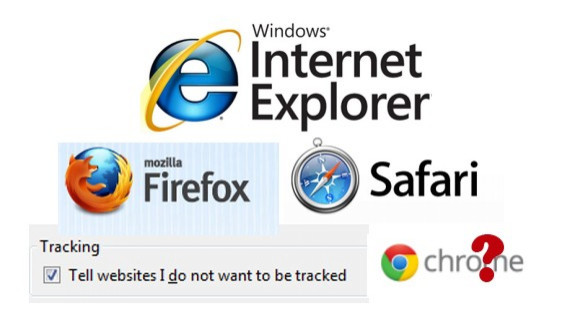Do Not Track: What You Need to Know About Web Browsing Privacy

Advertising on the Web is big business. This puts everyone who browses the Internet on a regular basis at risk of being tracked in hopes that they would click on an advertisement that interests them. One company that is well known for tracking its users, and even rumored to go as far as to deliberately bypass the “do not track me” system in Safari and Internet Explorer, is Google. We are going to share some ways to help you browse the Internet with confidence that Google, or any other advertising firm for that matter is not tracking you.
Soon, all major web browsers will have a “Do Not Track” button built in. This will give users the option to completely protect themselves and their privacy online from advertisers. Google Chrome is the only browser without a “Do Not Track” option, which is in no way surprising since Google earns a major chunk of its revenue from online advertising. Tracking your activities all across the Internet makes advertising to you easier as it allows Google to show advertisements that are consistent with your search activities and contents in your Gmail.
The first browser to adopt “Do Not Track” is Mozilla Firefox, followed by Internet Explorer and Safari. Oddly enough, Google did not follow suit with Chrome browser, but that is all about to change with upcoming “Do Not Track” button for the browser. Google did not specify when we are to see “Do Not Track” button in Chrome, only stating that we should expect it before the end of 2012.
How Does Do Not Track Work?
Whenever “Do Not Track” is enabled, cookies will not be used to build advertisements that are targeted to you. With that being said, if you want more personalized features, you will definitely be tracked, so it all boils down to the type of functionality users desire from their Web browsers.
Because some advertisers will still find a way to evade the “Do Not Track”, here are some general tips to follow if you are diagnosed with tracking phobia.
Facebook Likes
Clicking on the Facebook like button is a good way for Facebook advertisers to keep track of your browsing habits. There are many things on the Internet that is so enticing that you just have to press “like,” but if you think about it sometimes, there is no reason for you to press that like button every time. Consider the source of the content before diving in. Remember, on the Internet, no advertiser can be trusted, not even your mother.
Remove Cookies
Advertisers use cookies to keep track of you. By deleting your cookies, your privacy and browsing habits could be much safer. You can set cookies to automatically delete when you exit your browser, or if you want to go to the very extreme, you can turn it off altogether.
Be Careful of the Sites You Visit
The internet is filled with shady Web sites, so it is up to you to keep an eye out. Think of it as the real world where you have to be careful of your surroundings when you venture into a place you have never been before.
That’s all folks, browse safely.
(Reported by Vamien McKalin, edited by Surojit Chatterjee)
© Copyright IBTimes 2025. All rights reserved.





















